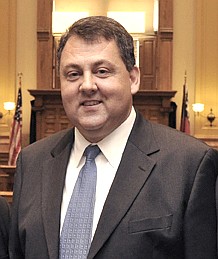As they debate whether to let electric membership corporations sell broadband internet, some Georgia lawmakers are debating whether they demand enough in return.
State Sen. Bill Cowsert, R-Athens, amended a bill Tuesday morning requiring that EMCs provide high-speed internet to all residents now without access. The bill is supposed to provide broadband to more rural areas.
Right now, lawmakers argue, many rural residents don't have access to fast internet because companies believe the investment will lose money. Homes in those communities are too spread out; there aren't enough customers to pay back the infrastructure costs.
But the bill's sponsor, state Sen. Steve Gooch, said Cowsert's amendment is too tough on EMCs. With this requirement, he argued, they won't even try to add broadband at all.
"That's a poison pill in this bill," Gooch, R-Dahlonega, said during a Senate Regulated Industries & Utilities Committee hearing Tuesday. "And in my opinion, we might as well stop now and go home, unless we're going to require [private companies] to do the same thing. Then you level the playing field."
The committee did not vote on the bill Tuesday. It will revisit it Thursday.
But some committee members argued that the requirement strikes at the spirit of EMCs, which were created by the Georgia General Assembly as nonprofit organizations in 1937. Thirty-six years later, the General Assembly passed an act that gave the EMCs a monopoly on electric service in different regions of the state.
Cowsert, the committee's sponsor, said Tuesday the general assembly gave the nonprofits that advantage in exchange for absorbing the cost of providing electricity in rural areas.
Jason Bragg, vice president of governmental regulations for Georgia EMC, said the corporations would probably not expand if required to give broadband to every customer.
"In a perfect world, that's what you would want to do," he said. "Absent a clear business plan that makes sense, I just don't think it's possible for us unless the state is prepared to offer - the state or the feds or whoever, prepared to offer - millions and millions of dollars to do that."
He said EMCs would need to time to slowly build out broadband plans. Eventually, he said, they might be able to expand to the more secluded, more expensive parts of their service areas.
"How long do you think that's going to take?" Cowsert asked. "Do you have any ideas?"
"I don't," Bragg said.
Later, Cowsert told Bragg, "We as a state have pretty much invested in EMCs by giving you monopolies and allowing you to have no competition. You, using that monopoly power, have built out an infrastructure that is ideally suited to provide broadband service."
State Sens. John Kennedy, R-Macon, and P.K. Martin, R-Lawrenceville, both agreed with Cowsert during Tuesday's meeting.
Even though the legislature has not carved out a law on the issue, some EMCs have provided broadband in Georgia for years. But to apply for federal grants that could help expand service, the EMCs need specific legislation written in the state code.
In March, the federal government gave the U.S. Department of Agriculture $600 million for broadband expansion. Bragg said the federal government set aside another $1.75 billion as part of its farm relief bill in December.
Contact staff writer Tyler Jett at 423-757-6476 or tjett@timesfreepress.com. Follow him on twitter @LetsJett.
